Interview with Janet
Janet Lawson, MFT | December 7, 2011
Tyler Barbee, the brother of one of our Autistry students interviewed Janet for a high school project. He did a wonderful job!
Janet Lawson, MFT | December 7, 2011
Tyler Barbee, the brother of one of our Autistry students interviewed Janet for a high school project. He did a wonderful job!
Dan Swearingen | November 5, 2011

Petaluman Julia Pozsgai, 22, has autism, but has excelled in the craft of woodworking. Among her many projects is this coffee table.
www.Petaluma360.com
In Julia Pozsgai’s bedroom is a large purple chair. Though she made it herself out of heavy cardboard, its tall back, exaggerated zig-zag design on the back and feet, and royal purple hue make it look more like a whimsical throne than a large piece of cardboard. [see more]
Janet Lawson, MFT | September 5, 2011
When Dan and I started Autistry Studios we wanted to create a place for our son, a place where he would thrive after we were gone. With the help of our students, their families, our staff and the community, Autistry is becoming more than we could ever have imagined.
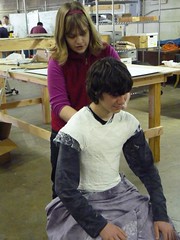 At Autistry we love to build things – models, swords, movies, books, armor, dragons…just about anything! But underneath the projects what we are building is community. We are learning how to help each other reach our goals and how to ask for help when our own goals seem out of reach.
At Autistry we love to build things – models, swords, movies, books, armor, dragons…just about anything! But underneath the projects what we are building is community. We are learning how to help each other reach our goals and how to ask for help when our own goals seem out of reach.
We hold the other end of a board while our classmate saws. We wrap a friend in plastic to help him make a mold for his armor. We give encouragement, praise and critical feedback. And we laugh together, eat together and play together.
Autistry Studios is becoming more than a program for learning skills. It is becoming a community of individuals who understand and accept each other.
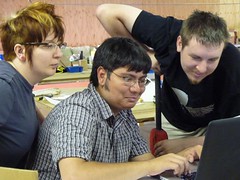 Last week a young boy told us he likes Autistry because here he gets “real help from real people.” We are proud of our staff members. Each one is kind, educated, experienced and quirky! Autistry attracts people with wild ideas and boundless energy – both staff and students. Though we are very different there is a like-mindedness that holds us together.
Last week a young boy told us he likes Autistry because here he gets “real help from real people.” We are proud of our staff members. Each one is kind, educated, experienced and quirky! Autistry attracts people with wild ideas and boundless energy – both staff and students. Though we are very different there is a like-mindedness that holds us together.
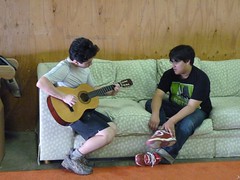
Our vision is to see this community grow wider and deeper – more members, more programs, more opportunities for growth. We want to insure that our students not only acquire vocational skills but create personal bonds that will span a lifetime. Those bonds will be their safety net, giving them strength and support as they grow older.
Janet Lawson, MFT | September 2, 2011
We’re doing it again! The 3rd annual Spin ‘N Sizzle happens on Sunday, October 16th from 10am to 3pm. Great exercise. Great food. Great people. Hosted by Michael and Christine Lopez of Body Image Personal Fitness Center.
Everyone has a blast at the Autistry Spinathon. Here is a link to some photos of last year’s fun! This year our goal is “A Butt on Every Bike!”
Hope to see you there!
To buy seats online go to our Pay for Spin and Sizzle Page
Dan Swearingen | April 30, 2011
by Dan Swearingen and Janet Lawson, MFT
The core mission of Autistry Studios is supporting the transition of ASD youth to whatever level of adult independence each individual is capable of achieving. Our Core Workshops and our new Drama Workshops prepare students for adult life by exercising and growing executive skills while building confidence and mental resiliency. These skills combined support real time decision-making and the ability to act on decisions – the abilities needed to successfully work and create.
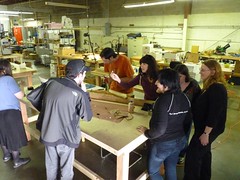 Our existing Core Workshops include a range of activities that could be characterized as going from “play” to “playful work.” Last year, as Autistry grew to including a growing adult student body we felt a need for more direct employment training: An employment program which could be thought of as picking up from “playful work” and transitioning into “realistic work.”
Our existing Core Workshops include a range of activities that could be characterized as going from “play” to “playful work.” Last year, as Autistry grew to including a growing adult student body we felt a need for more direct employment training: An employment program which could be thought of as picking up from “playful work” and transitioning into “realistic work.”
Importance of Work
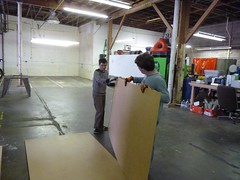 Meaningful work is how we establish our identity, maintain our independence, and construct a real relationship with our community. Without appropriate opportunities to work our students are denied independence, denied an adult identity, and denied a real place in our community.
Meaningful work is how we establish our identity, maintain our independence, and construct a real relationship with our community. Without appropriate opportunities to work our students are denied independence, denied an adult identity, and denied a real place in our community.
Building the ability to work is fundamental to fulfilling our mission supporting transition for ASD youth.
Our programs have always been driven by the needs of the students with whom we work. Our students today need initial work experience in safe situations where they can explore and learn initial job skills, practice social skills, and cultivate their work ethic.
Initial experiments
Our first experience providing work was to have students work extra hours doing chores around our workshop areas. This was a gentle extension of their normal workshop schedule. This succeeded to some extent but highlighted requirements a more robust program would need to meet:
Our new employment programs for Q3-Q4 2011
Based on the lessons we have learned and to the extent that funding permits, we will be rolling out several internal direct employment businesses to which Autistry students would be eligible to apply starting summer of 2011.
In the past these internal businesses would have been called sheltered work programs but the current trend is to call programs like these Social Enterprises. This is a wide ranging term for any program that applies capitalistic strategies to achieving philanthropic goals. In our usage we will be calling these new Autistry Studios employment projects Autistry Enterprises.
The goal of the Autistry Enterprises is to set up a cluster of internal businesses that feed business to each other as well as outside businesses and customers much as a Japanese keiretsu (network of companies) functions.
Autistry Publishing
 A couple of our students are in the process of writing books which will be published by Autistry Studios. In addition to the direct processes of producing content, digital textblock, illustrations, and actually printing books we will be handling ISBN registration and setting up sales and delivery channels.
A couple of our students are in the process of writing books which will be published by Autistry Studios. In addition to the direct processes of producing content, digital textblock, illustrations, and actually printing books we will be handling ISBN registration and setting up sales and delivery channels.
This Autistry enterprise will feed business into Autistry IT (website, e-commerce, technical support) and Autistry Figures (figure from the books) – both described below.
Autistry Railroad
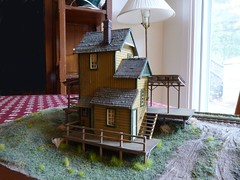 The Autistry RR will produce model structure kits in cut-and-fold, cast plaster, cast resin, and eventually laser-cut wood and plastic formats. This company will employ designers working on CAD systems, technical writers/illustrators making instruction material, workers producing and packaging kit materials while maintaining inventory, and workers handling and fulfilling orders.
The Autistry RR will produce model structure kits in cut-and-fold, cast plaster, cast resin, and eventually laser-cut wood and plastic formats. This company will employ designers working on CAD systems, technical writers/illustrators making instruction material, workers producing and packaging kit materials while maintaining inventory, and workers handling and fulfilling orders.
This Autistry enterprise will feed business into Autistry Publishing (printed materials, packaging) and Autistry IT (website, e-commerce, technical support).
Autistry Figures
 Autistry Figures will produce customized figures in many formats. Some will be hand painted figures available commercially; others will be complete custom creations.
Autistry Figures will produce customized figures in many formats. Some will be hand painted figures available commercially; others will be complete custom creations.
This Autistry enterprise will feed business into Autistry Publishing (printed materials, packaging) and Autistry IT (website, e-commerce, technical support).
Autistry IT
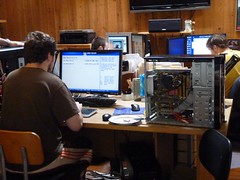 Autistry IT will provide computer hardware and software support to Autistry Studios and Autistry Enterprises. It will produce and manage websites for all the Autistry activities including e-commerce capabilities.
Autistry IT will provide computer hardware and software support to Autistry Studios and Autistry Enterprises. It will produce and manage websites for all the Autistry activities including e-commerce capabilities.
Next Steps
We have the resources to start the Autistry Enterprises but they will need significant direct family support to grow to a point where they can provide paid employment.
[Updated 9/2/2013]
The Autistry Employment Program was launched as the Autistry Model Employment Program in June 2013.
Janet Lawson, MFT | April 27, 2011
By Janet Lawson, Liz McDonough, and Dan Swearingen
 We are coming up on the 3rd anniversary of Autistry Studios (once known as The Barn Project). We are looking back at our journey in amazement and we are looking to our future with renewed passion. As Autistry Studios continues to grow, so does our vision. Autistry has truly become a center for learning and we are humbled by how much we are educated by our students with each workshop. We are using this knowledge to further develop our model and refine our approach. In this first of a series of mini-articles we would like to share some of these insights and what they mean for the future of Autistry.
We are coming up on the 3rd anniversary of Autistry Studios (once known as The Barn Project). We are looking back at our journey in amazement and we are looking to our future with renewed passion. As Autistry Studios continues to grow, so does our vision. Autistry has truly become a center for learning and we are humbled by how much we are educated by our students with each workshop. We are using this knowledge to further develop our model and refine our approach. In this first of a series of mini-articles we would like to share some of these insights and what they mean for the future of Autistry.
 Perhaps the biggest change in the Core Workshops over the last three years has been increasing the age range and verbal range of students in the program. Initially we focused only on high verbal high-school age students, convinced that lower verbal and older individuals would not benefit from our programs.
Perhaps the biggest change in the Core Workshops over the last three years has been increasing the age range and verbal range of students in the program. Initially we focused only on high verbal high-school age students, convinced that lower verbal and older individuals would not benefit from our programs.
When we were approached by families with older children and some with children with lower verbal ability we decided to see if our program would work for them. We quickly experienced for ourselves the simple truth: regardless of one’s age the mind continues to learn. This revelation gave us so much hope – that learning does occur across the life-span. It doesn’t stop at 20. For any individual student this means long term goals can be ambitious, it is just a question of appropriate intermediate steps and time. This holds for the low verbal students as well. Over time they continue to learn, therefore over a long enough time span of appropriate challenges they too can reach impressive goals.
 The second lesson we learned is that building a solid relationship with each student is essential. Each student needs to be seen and to feel heard. They need to experience themselves reflected back in a positive light. Many students come to Autistry having experienced negative social interaction at school or in recreational programs. They often do not understand why they have difficulty making friends or sustaining friendships. During the initial relationship building phase we take the time to get to know the student. In this process, we also share ourselves. It is not a one-sided interaction, but a lively and dynamic exchange. It takes time to understand someone and even longer to learn to trust them. But when we achieve mutual respect and trust the learning can really begin. That is when, as one student put it, “They really get me.” This is the very foundation of our work.
The second lesson we learned is that building a solid relationship with each student is essential. Each student needs to be seen and to feel heard. They need to experience themselves reflected back in a positive light. Many students come to Autistry having experienced negative social interaction at school or in recreational programs. They often do not understand why they have difficulty making friends or sustaining friendships. During the initial relationship building phase we take the time to get to know the student. In this process, we also share ourselves. It is not a one-sided interaction, but a lively and dynamic exchange. It takes time to understand someone and even longer to learn to trust them. But when we achieve mutual respect and trust the learning can really begin. That is when, as one student put it, “They really get me.” This is the very foundation of our work.
Once we build the relationship, we find that students are more likely to reveal their personal challenges without defensiveness. Our workshops teach skills but our instructors also model problem-solving, exploration, making mistakes and bouncing back from them. Each new project represents a leap into the unknown and our role is to serve as the guide to this unfamiliar territory. It is our belief that each project fosters a developmental leap, which in turn points the way to the next challenge.
 We have found that it is imperative to assess the developmental level of each student, because it helps us understand how they are seeing the world and what challenges they are attempting to navigate. Chronological age and developmental age are often quite different. As parents and as service providers we often forget that a basic issue of autism is developmental delay. And it is not a global delay because another fundamental issue of ASD is uneven development; different aspects of the individual mature at different rates. One may be academically advanced yet emotionally behind. One may be physically mature yet intellectually unsophisticated. We believe that in order for a student to advance we must embrace all their different strengths and weaknesses.
We have found that it is imperative to assess the developmental level of each student, because it helps us understand how they are seeing the world and what challenges they are attempting to navigate. Chronological age and developmental age are often quite different. As parents and as service providers we often forget that a basic issue of autism is developmental delay. And it is not a global delay because another fundamental issue of ASD is uneven development; different aspects of the individual mature at different rates. One may be academically advanced yet emotionally behind. One may be physically mature yet intellectually unsophisticated. We believe that in order for a student to advance we must embrace all their different strengths and weaknesses.
Autistry has become far more than a 4-hour workshop; it is a model to support ASD teens and adults in transition. Membership in our Core Workshop Program includes the following services:
We also offer additional counseling support to individuals, groups and families. We are available for 1:1 mentoring sessions, tutoring and consultation.
 Our mission is to support teens and adults with ASD in making the transition from their current situation to secondary schooling and/or meaningful vocation. For some, this may be a shorter path, but for most of our students it is a bumpy road filled with twists and unexpected turns. And though we pride ourselves on helping our students improve executive functioning, the ability to have meaningful relationships and gain valuable vocational skills, we strive most of all to instill a sense of resiliency. It is this quality that will allow them to fall off the horse and get right back on it. It is resiliency that will keep them receptive to learning and open to taking risks despite the obstacles along the way. At Autistry, we hold the conviction that individuals, be they in their teens, 20’s, 30’s or 40’s can and will progress if they are simultaneously supported and challenged.
Our mission is to support teens and adults with ASD in making the transition from their current situation to secondary schooling and/or meaningful vocation. For some, this may be a shorter path, but for most of our students it is a bumpy road filled with twists and unexpected turns. And though we pride ourselves on helping our students improve executive functioning, the ability to have meaningful relationships and gain valuable vocational skills, we strive most of all to instill a sense of resiliency. It is this quality that will allow them to fall off the horse and get right back on it. It is resiliency that will keep them receptive to learning and open to taking risks despite the obstacles along the way. At Autistry, we hold the conviction that individuals, be they in their teens, 20’s, 30’s or 40’s can and will progress if they are simultaneously supported and challenged.
Our next installment will be Liz’s thoughts on a new Drama Theater Workshop program.
Dan Swearingen | November 7, 2010
Easter Seals focuses on many disabilities and especially Autism Spectrum Disorders. Their Living With Disability Study paints a startling picture of the life-long challenges surrounding everyday life and future concerns for parents of adult children with disabilities and adults with disabilities.
Many parents worry their adult children’s basic needs for employment, housing, transportation, social interactions, recreation, healthcare and financial security will not be met:
- Only 11% of parents of adult children with disabilities report their child is employed full time.
- Just 6 in 10 parents of adult children with a disability rate their child’s quality of life as excellent or good (61%), compared to 8 in 10 parents of adults without a disability (82%).
- Huge gaps exist in parents of adults with disabilities’ assessment of their child’s ability to manage their own finances (34% vs. 82% parents of adults without disabilities) and have the life skills necessary to live independently (30% vs. 83% parents of adults without disabilities).
- Nearly 7 in 10 adults with disabilities (69%) live with their parent(s) or guardian; only 17% live independently compared to more than half of adult children without disabilities (51%).
These are the very concerns that we hope Autistry Studios can help address for individuals and families living with ASD and other related communication/social disorders.
Dan Swearingen | November 2, 2010
Janet and I are really happy about the presentations we did this Tuesday and Wednesday for the North Bay Regional Center about Building Social Skills and Networking for People with ASD. Here’s a link to the slides we used.
If you attended, please comment on any resources you’d like us to add and I’ll expand this post.
Dan Swearingen | August 24, 2010
The Ryder foundation generously supports Autistry Studios programs and they are putting on a great show at the Palace of Fine Arts this September 11. Many of our students will be displaying their art work at auction at the event. Please join us. See the Ryder Foundation website for more information.
Dan Swearingen | April 8, 2010
 The Friday, April 9, 2010 issue of the Pacific Sun has a cover story about Autism written by one of our student’s parents, Linda Xiques. It discusses parents and their children who are part of the wave of ASD youth in transition to adulthood. Janet and I are interviewed discussing our motivations and goals in designing Autistry Studios.
The Friday, April 9, 2010 issue of the Pacific Sun has a cover story about Autism written by one of our student’s parents, Linda Xiques. It discusses parents and their children who are part of the wave of ASD youth in transition to adulthood. Janet and I are interviewed discussing our motivations and goals in designing Autistry Studios.
A high quality PDF of Autism Enters Adulthood with pictures.